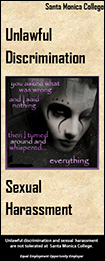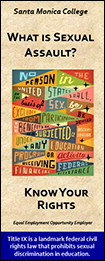Unlawful discrimination is conduct that denies or limits a person’s full and equal access to participate in, or benefit from education and/or employment programs, services or activities because of decisions made on the basis of that person’s protected status(es).
See SMC's Nondiscrimination Policy for more information on Title 5.
Unlawful harassment is a form of discrimination; it is unwelcome conduct that is based on the following federally mandated statuses:
- Age (40 and over)
- Ancestry
- Color
- Denial of Family & Medical Care Leave
- Disability (mental and/or physical disabilities)
- Ethnic Background
- Gender, Gender Identity & Expression
- Genetic Information
- Marital Status
- Medical Condition (Cancer, Genetic Information)
- Military or Veteran Status
- National Origin (includes language use restrictions)
- Pregnancy (including Childbirth, Breastfeeding)
- Race
- Religion (including dress, grooming & religious practices)
- Sex, including pregnancy, childbirth, breastfeeding and/or related medical conditions)
- Sexual Orientation
- Using racial epithets against an individual or group of people
- Pictures or graphics that are derogatory to an ethnic or religious, or sexual group
- Teasing a person because of his/her sexual orientation
- Denying a person access to a restroom because of the person’s gender
- Firing a female employee because she is pregnant or needs to breastfeed during working hours
- Refusing to provide a reasonable accommodation to ensure equal opportunity to programs and/or activities to a person with a disability
- Demanding sexual favors in return for a good grade or promotion
- Sending texts or emails of a sexual nature
- Repeatedly asking someone out on a date who has indicated that they are not interested
- Denying medical or family leave when appropriate documentation has been submitted
- Refusing to hire a person or admit a student to a program or class solely based on a perceived disability
- Using a legally protected status as an excuse not to hire or to deny a promotion
It's On Us. Harassment in the workplace will not stop on its own - it's on all of us to be part
of the fight to stop workplace harassment. We cannot be complacent bystanders and
expect our workplace cultures to change themselves.




